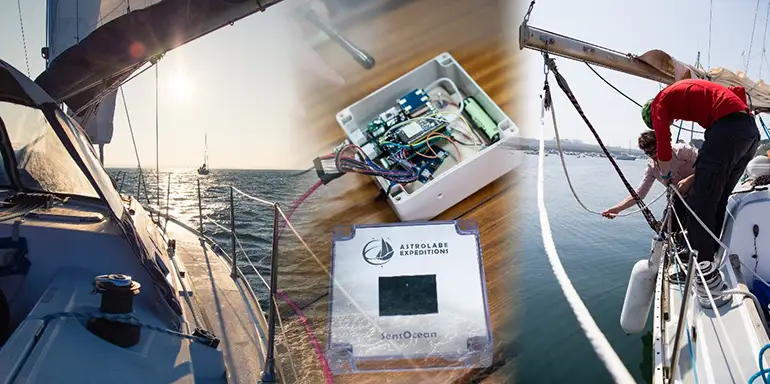Coast and Sea Days 2022: Climate change challenges for the coastline
On June 9 and 10, Fondation de France is organizing the Coast and Sea Days 2022 in La Rochelle. In partnership with La Rochelle University, the Sea’ties initiative of the Ocean & Climate platform, as well as the National Association of Coastline Elected Officials (Association Nationale des Élus du Littoral – ANEL), this edition is focused on the challenges that coastal towns and regions face as they confront the effects of climate change.
Encouraging discussion
Committed to environmental issues, Fondation de France has been organizing regional meetings under the auspices of its Coast and Sea Program since 2016. This year, the gathering is taking place in La Rochelle, European Capital of the Sea for 2022. Project planners, scientists, elected officials, regional agencies, civil society representatives and those who make use of the coastline will come together to share good practices and exchange ideas and information, especially in the domains of science and civil society. The goal: to find immediate and future solutions for climate change and its impacts on coastal areas.
Asking the question “Adapting Towns and Coastal Areas to Climate Change: What is the Future?” these two days will give some 200 participants a chance to work on major issues such as coastal urbanization, restoring lagoon ecosystems and creating an observatory for coastal erosion and submersion risks. There will also be field visits. For example, in the Port-Neuf neighborhood of La Rochelle, where cyclone Xynthia demonstrated the fragility of the coastline, participants will be able to see the protection projects (riprap, seawalls) put in place by the flood prevention program to counter submersion risks. Another example is the Marais d’Yves, a nature reserve with a sandspit that is vulnerable to submersion and erosion. A second seawall was built to protect a railroad and a highway. Two examples, two solutions, one of pure defense, the other allowing the sea to freely adapt to the land, showing the different adaptation options available for towns and cities as they deal with climate change, and the issues these solutions address.
The coast and the sea: threatened ecosystems
For time is of the essence: sea levels increased more than 20 centimeters during the 20th century, and this phenomenon is continuing at an accelerated pace. By 2100, the level of the ocean will rise by one meter, in places where coastal erosion is intensifying and where the population is dense and continues to grow. For coastal towns, cities and the surrounding areas, the stakes are enormous: the safety of the population and economic activities, protection of infrastructure and ports, preservation of natural areas – so many questions that need to be answered while simultaneously involving both the local population and stakeholders.
For over 50 years, Fondation de France and many of its donor-advised funds have mobilized to protect the coastline. The Fondation Léa Nature, located in La Rochelle, for example, supports pollution cleanup with the non-profit Wings of the Ocean. Cleaning the beaches and the seaside, recycling waste, sea missions – the goal is to make people aware of the dangers and consequences of plastic pollution on marine biodiversity. The foundation also works with the E.C.O.L.E. de la Mer (Sea School) association, setting up educational workshops for children that encourage them to get involved in preserving the marine biodiversity of La Rochelle. Fostering ecological awareness and local involvement is also one of the goals of the Fondation Linktogether, which supports the creation of civic coastal observatories and scientific sea expeditions with Astrolabe Expeditions. These initiatives aim to increase ocean-climate knowledge and interaction, by bringing together all citizens who wish to get involved in preserving the marine environment. Finally, the Fondation Cabestan supports the Bloom NGO for its ocean protection awareness campaigns for a variety of audiences: conferences, exhibits, educational workshops, etc. In particular, the association works with elementary school groups under the Philanthropy School Program, supported by Fondation de France and the Fondations Edmond de Rothschild.

Participatory research to think and act collectively
Since 2011, Fondation de France’s Coast and Sea Program has made it possible to explore sustainable solutions to protect and adapt coastal areas by encouraging partnerships between the sciences and civil society. The objective: to promote collective thinking by bringing together concerned parties that do not usually work together, and to identify and deploy concrete management solutions for these at-risk areas. With this approach, they aim to meet the multiple challenges facing the future of these coastal and maritime spaces and ecosystems. In over 10 years, the program has supported close to 200 actions to protect the coast and the sea.
Two examples: Supported since 2017, the Plages Vivantes project was created by researchers to measure and understand the impact of climate change and human activity on sea wrack. Composed of seaweed and animal debris, sea wrack is vital food to many birds, and it also slows beach erosion. By asking school children to do the data collection, this program offers an enjoyable way to connect citizens with the importance of coastal management and conservation. Meanwhile, the REVE Cot project brings together scientists from diverse fields (physical sciences, natural sciences, social sciences). It aims to explore the impact of rising sea levels on coastal cities via virtual reality. Aside from the flood risk maps for both the ocean and the land, this research stimulates thinking on urbanization options for coastal cities in the future.

